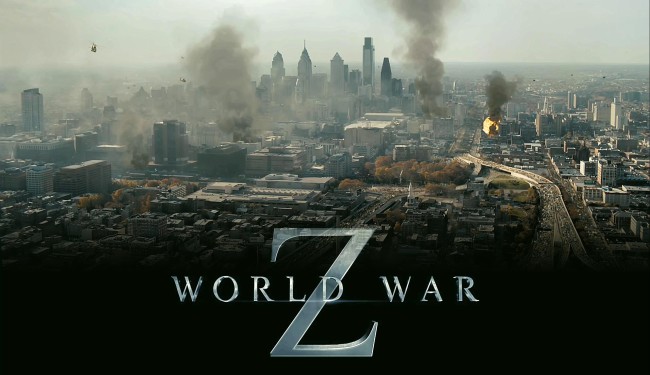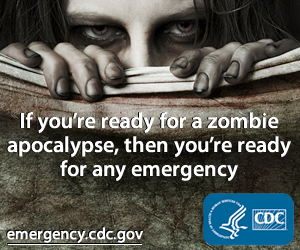Are You Prepared for World War Z?

Today’s opening of Brad Pitt’s summer blockbuster World War Z begs the question “How prepared are you for a zombie apocalyse?”
Fortunately, the US government has a website- Preparedness 101: Zombie Apocalypse to help you.
The blog was concieved by the Centers for Disease Control (CDC) associate director of communications Dave Daigle in 2011 as a creative way to promote emergency preparedness for the upcoming hurricane season. It became an overnight sensation: normally, the CDC might get around 3,000 page views a week, but after word got out about the blog entry, the CDC Emergency’s Twitter feed went from 12,000 to 1.2 million followers. The volume to their blog site crashed several times because of the increase in traffic.

After all, as their slogan says: “If you’re ready for a zombie apocalypse, then you’re ready for any emergency!”
I think the CDC and Celebrity Diagnosis are on the same page : As Dave Daigle put it: “There’s not a lot of pickup on the message. Preparedness and public health are not the sexiest subjects.” But put a little spin on it, such as zombies or celebrities, and the public becomes interested in messages that contain important information.”
So what does the government suggest you need to do should the threat of zombies…or hurricanes or pandemics, actually happen?
First- have an emergency kit in your house and/or car. This includes things like water, food, and other supplies to get you through the first couple of days before you can locate a zombie-free refugee camp (or in the event of a natural disaster, it will buy you some time until you are able to make your way to an evacuation shelter or utility lines are restored). Below are a few items you should include in your kit, for a full list visit the CDC Emergency page:
Water (1 gallon per person per day)
Food (stock up on non-perishable items that you eat regularly)
Medications (this includes prescription and non-prescription meds)
Tools and Supplies (utility knife, duct tape, battery powered radio, etc.)
Sanitation and Hygiene (household bleach, soap, towels, etc.)
Clothing and Bedding (a change of clothes for each family member and blankets)
Important documents (copies of your driver’s license, passport, and birth certificate to name a few)
First Aid supplies (although you’re a goner if a zombie bites you, you can use these supplies to treat basic cuts and lacerations that you might get during a tornado or hurricane)
Once you’ve made your emergency kit, sit down with your family and come up with an emergency plan. This includes where you would go and who you would call if zombies started appearing outside your door step. You can also implement this plan if there is a flood, earthquake, or other emergency.
Pick two meeting places, one close to your home (such as your mailbox, or a neighbors front yard) and one farther away.
Identify the types of emergencies that are possible in your area. Besides a zombie apocalypse, this may include floods, tornadoes, or earthquakes. If you are unsure contact your local Red Cross chapter for more information.
Pick a meeting place for your family to regroup in case zombies invade your home… or your town evacuates because of a hurricane. Pick one place right outside your home for sudden emergencies and one place outside of your neighborhood in case you are unable to return home right away.
Identify your emergency contacts. Make a list of local contacts like the police, fire department, and your local zombie response team. Also identify an out-of-state contact that you can call during an emergency to let the rest of your family know you are OK.
Plan your evacuation route. When zombies are hungry they won’t stop until they get food (i.e., brains), which means you need to get out of town fast! Plan where you would go and multiple routes you would take ahead of time so that the flesh eaters don’t have a chance! This is also helpful when natural disasters strike and you have to take shelter fast.
So, what do you think about this kind of government campaign? Do you think the twist makes it more likely that people will read the message? How about whether they will act on the information? Leave us a comment with your thoughts.



























0 comments